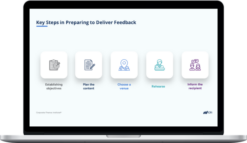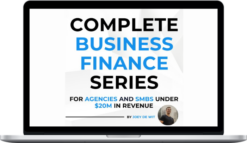Wall Street Prep – Financial Planning & Analysis Modeling Certification
$499.00 $138.00
Wall Street Prep – Financial Planning & Analysis Modeling Certification
Wall Street Prep’s globally recognized certification program prepares trainees with the skills they need to succeed as a Financial Planning and Analysis (FP&A) professional.
The First Rigorous Certification for the FP&A Profession
- Bridging the gap between theory and practice in FP&A
The FPAMC© is focused on equipping learners with actual, practical competencies and best practices in FP&A. Developed by FP&A professionals and used by finance teams from the world’s leading companies, you’ll learn how to forecast detailed operating models step-by-step, create long-range plans with built-in scenarios, and craft both short- and long-term projection models and construct data visualizations that bring numbers to life.
- Job-Focused Certification Program
Solid financial modeling, data analysis and forecasting know-how is just one part of the FP&A professional’s toolbox. This challenging position also requires interpreting, visualizing and presenting data – often stepping back from modeling and data analysis to work cross-functionally to arrive at answers. The FPAMC© fills these knowledge gaps and establishes best practices for FP&A professionals.
This FP&A certification course is career-focused. We begin with an overview of the FP&A career pathway, what the role entails and the systems and concepts you need to know. We move on to build an operating and forecasting model and create a long-range planning model to discuss the use of scenarios and sensitivities in forecasting. Finally, we learn how to use short-term pacing models, dynamic dashboards and data visualization to inform and influence business partners. As a bonus, we explore how to utilize advanced corporate finance principles to guide firm strategy.
What You’ll Learn In Financial Planning & Analysis Modeling Certification?
An Introduction to FP&A
- Module 1 of the FP&A Modeling Certification Program (FPAMC©) starts with an introduction to the FP&A role and explores the types of responsibilities typical for an FP&A professional, such as recurring reporting and accounting close, forecasting and budgeting, pacing & performance reporting, project analysis, and ad hoc analysis. We then cover the types of tools and systems used on the job, focusing on the most common of these, Excel and PowerPoint. We finish the module by exploring the accounting, corporate finance, statistics, and data analysis foundations you’ll need to hit the ground running.
Building the Operating Model – The Income Statement
- Module 2 of the FP&A Modeling Certification Program (FPAMC©). A major responsibility of the FP&A function is to come up with reasonable, defensible, and insightful expectations of future sales, expenses, and headcount requirements. Here we’ll learn the difference between fixed and variable expenses, different approaches to forecasting revenue, and how headcount needs are determined. Of note will be a focus on not just financial metrics, but the critical operating metrics which drive them.
Building the Operating Model – The Balance Sheet
- Module 3 of the FP&A Modeling Certification Program (FPAMC©). To support our future expectations of business performance, investments, research, and projects need to be developed and initiated today. This requires building projections around these items to determine funding requirements and future impacts on the business.
Building the Operating Model – The Cash Flow Statement
- Module 4 of the FP&A Modeling Certification Program (FPAMC©). While projections of revenues, expenses, and capital projects can be incredibly insightful, cash flows are incredibly important for understanding the impact on company liquidity as well as its ability to finance required payments and projects. Understanding how cash flows through the business can also highlight opportunities to improve cash flows.
Pulling Together the Operating Model
- Module 5 of the FP&A Modeling Certification Program (FPAMC©). With detailed forecasts of the Income Statement, Balance Sheet, and Cash Flow Statements, we pull all three financial statements together to understand the full impact to the business. These operating models can be tailored to report on things such as fundraising and liquidity needs, profitability and returns trends, as well as trends in operating efficiency.
Project Management, Long-Range Planning & Analysis
- Module 6 of the FP&A Modeling Certification Program (FPAMC©). The beauty of well-built financial models lies not just in being building out detailed projections for the next 12-18 months, but being able to create more dynamic, long-range plans to visualize the impact that changes in these assumptions will have on the expected course of the business. Together we’ll build a three-statement 5-year plan for our company, and will layer scenarios and sensitivities onto our model to answer insightful what-if’s about future performance, and will build a highly dynamic, reusable Budget vs Actual template for Revenue complete with Rate-Volume analysis and Waterfall chart.
Presentation Best Practices & Building Dashboards
- Module 7 of the FP&A Modeling Certification Program (FPAMC©). One of the most important roles of FP&A is learning how to surface the right data, at the right time, to the right individuals, all in a format that is easy to digest. We’ll also learn how to build data lookups, dynamic charts, and output summaries while we build out a projection model for daily transactions. We’ll end the chapter by building out a very useful Dashboard to highlight historical financial results.
Appendix: Corporate Finance Principles
- An Appendix of the FP&A Modeling Certification Program (FPAMC©). FP&A professionals must be able to understand corporate finance best practices, in addition to being able to build financial models. Here we’ll discuss corporate finance theory, understanding how companies fund their operations, trade-offs of debt and optimal debt ratios, fundamental drivers of company growth, and other topics.
Who is Financial Planning & Analysis Modeling Certification for?
- FP&A Analysts and Managers
- Financial Reporting Groups
- Controllers and CFOs
- Accounting Professionals
More courses from the same author: Wall Street Prep
Be the first to review “Wall Street Prep – Financial Planning & Analysis Modeling Certification” Cancel reply
You must be logged in to post a review.
When will I receive my course?
You will receive a link to download your course immediately or within 1 to 21 days. It depends on the product you buy, so please read the short description of the product carefully before making a purchase.
How is my course delivered?
We share courses through Google Drive, so once your order is complete, you'll receive an invitation to view the course in your email.
To avoid any delay in delivery, please provide an Gmail and enter your email address correctly in the Checkout Page.
In case you submit a wrong email address, please contact us to resend the course to the correct email.
How do I check status of my order?
Please log in to Courseforjob account then go to Order Page. You will find all your orders includes number, date, status and total price.
If the status is Processing: Your course is being uploaded. Please be patient and wait for us to complete your order. If your order has multiple courses and one of them has not been updated with the download link, the status of the order is also Processing.
If the status is Completed: Your course is ready for immediate download. Click "VIEW" to view details and download the course.
Where can I find my course?
Once your order is complete, a link to download the course will automatically be sent to your email.
You can also get the download link by logging into your Courseforjob account then going to Downloads Page.
Related products
Sales & Marketing
Finance & Accounting
Dominique Broadway – Put Your Money to Work: Take Control of Your Business’ Finances
Design & Creative
Film Editing Pro – Premiere Pro Quickstart + Power User Pack
Development & IT
Finance & Accounting
Corporate Finance Institute – Giving Effective Feedback Course
Finance & Accounting
Design & Creative
Finance & Accounting











Reviews
There are no reviews yet.